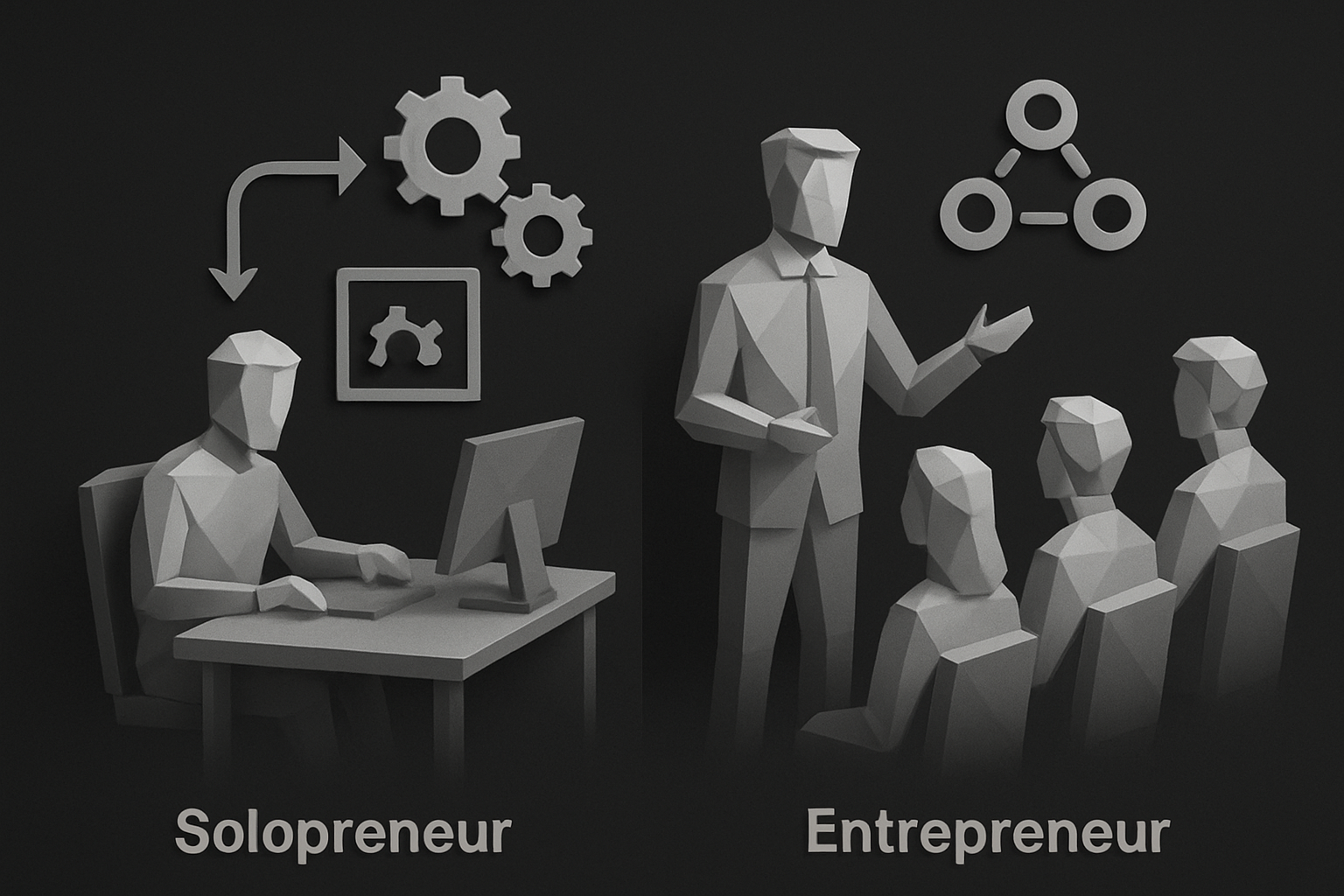Solo business ownership is booming—yet the line between solopreneur vs entrepreneur has never been more blurred. With remote work and digital tools reshaping how we build businesses, many people feel unsure which path suits them best in 2025.
Understanding the difference is crucial. It affects your business structure, daily operations, growth potential, and even your personal satisfaction. This article offers a clear, side-by-side look at solopreneur vs entrepreneur, covering definitions, business models, financial risk, growth mindset, roles, pros and cons, and which path fits your goals.
Ready to decide which journey is right for you? Let’s dive in.
Defining Solopreneur and Entrepreneur
The solopreneur vs entrepreneur debate is more relevant than ever as business models shift in the digital era. To make an informed decision about your own path, it’s crucial to understand precisely what each term means—and where the lines blur or overlap.

What is a Solopreneur?
A solopreneur is a business owner who manages every aspect of their venture independently. Unlike traditional entrepreneurs, solopreneurs operate solo, typically without full-time employees. Common structures for solopreneurs include single-member LLCs and S-Corps, which allow for personal liability protection and straightforward tax filing.
You’ll often find solopreneurs in roles such as:
- Freelance graphic designers
- Digital product creators
- Independent consultants
Key characteristics include full autonomy in decision-making, total responsibility for outcomes, and the option to hire contractors for specialized tasks (but not employees). The solopreneur vs entrepreneur distinction is driven by this solo mindset. Digital business models and remote work have fueled a rise in solopreneurship, making it a fast-growing segment in today’s economy.
What is an Entrepreneur?
An entrepreneur is someone who launches a business with the intention to grow, scale, and build a team. Entrepreneurs are visionaries who look beyond solo operations, often forming LLCs, corporations, or partnerships to support expansion.
Typical entrepreneur examples include:
- Tech startup founders
- Restaurant owners expanding to multiple locations
Entrepreneurs focus on growth, team building, and delegation. They may start out alone, but their plan almost always involves hiring employees and scaling operations. The solopreneur vs entrepreneur question comes down to intent—entrepreneurs design their businesses for scalability and impact, navigating more complex structures and greater financial responsibilities as they grow.
Core Similarities and Overlaps
Despite their differences, there’s significant overlap in the solopreneur vs entrepreneur landscape. Both are self-starters, take calculated risks, and innovate within their industries. Many businesses start as one-person ventures, and freelancers can easily transition into solopreneurs or even entrepreneurs over time.
Key similarities include:
- Aiming for profitability and market impact
- Willingness to innovate and adapt
- Managing risk and uncertainty
According to Shopify, over 40% of new businesses in 2024 began as solo operations. For a deeper dive into these distinctions, check out this Solopreneur vs Entrepreneur: Key Differences Forbes article, which explores definitions, business structures, and operational approaches.
Why Definitions Matter in 2025
In 2025, the solopreneur vs entrepreneur distinction matters more than ever. Remote work, automation, and digital products have blurred traditional business lines, making it easy to confuse the two paths. However, legal, financial, and operational implications vary significantly.
Choosing the right path impacts:
- Taxes and liability
- Daily lifestyle and work-life balance
- Long-term growth potential
For example, a digital creator must decide whether to remain solo or build an agency. Understanding these distinctions helps set realistic goals, manage expectations, and build a business that aligns with your personal vision.
Business Structure and Operations
Understanding the business structure and daily operations is crucial when comparing solopreneur vs entrepreneur paths. The way you approach team building, decision-making, finances, daily workload, and technology will shape your business experience and potential for growth.

Team Building and Delegation
The solopreneur vs entrepreneur debate often begins with team structure. Solopreneurs operate alone, managing every aspect of their business. They may hire freelancers, but rarely build a permanent team. Entrepreneurs, on the other hand, focus on assembling teams, hiring employees, and delegating tasks.
Here's a quick comparison:
| Aspect | Solopreneur | Entrepreneur |
|---|---|---|
| Team Size | Solo | Small to large teams |
| Delegation | Rare, mostly outsource | Regular, to employees |
| Scalability | Limited by self | High, via team |
A solopreneur handles marketing, sales, and customer service personally, while an entrepreneur might hire a marketing manager or operations staff. This fundamental difference in the solopreneur vs entrepreneur approach impacts both scalability and workload. For a deeper exploration of these distinctions, check out 6 Differences Between Solopreneurs and Entrepreneurs.
Decision-Making Processes
Decision-making is another area where the solopreneur vs entrepreneur journey diverges. Solopreneurs enjoy full autonomy—every decision, from branding to software choice, is made quickly and independently. This agility allows them to adapt fast and pivot as needed.
Entrepreneurs, however, often involve their teams in decisions. They seek input from managers or partners, which can bring valuable perspectives but may slow down the process. The increased complexity can lead to more thorough, but less agile, outcomes.
The solopreneur vs entrepreneur difference here affects both speed and stress levels. Solopreneurs may feel the pressure of solo responsibility, while entrepreneurs juggle the challenge of consensus building.
Financial Management and Risk
When it comes to finances, the solopreneur vs entrepreneur contrast is clear. Solopreneurs typically face lower startup costs, simpler tax filings, and fewer financial obligations. Their business income often flows directly to personal income, and they manage expenses like software or contractor fees.
Entrepreneurs, in contrast, must handle payroll, employee benefits, office leases, and higher overhead. Their financial risk is greater, but so is their potential for outside investment and larger returns. Entrepreneurs often seek funding or loans, while solopreneurs bootstrap their ventures.
This difference in financial management shapes the risk profile and growth potential for each path in the solopreneur vs entrepreneur landscape.
Daily Operations and Workload
Daily life looks very different in the solopreneur vs entrepreneur world. Solopreneurs wear many hats—one person handles everything from social media to invoicing. This can mean long hours, but also full control and flexibility.
Entrepreneurs, by delegating tasks, can focus on leadership and strategy. They oversee operations but rely on staff to execute. While this can reduce personal workload, it introduces new challenges, such as managing people and processes.
The solopreneur vs entrepreneur choice here comes down to preference: do you want the freedom (and responsibility) of doing it all, or the potential for impact by leading a team?
Use of Technology and Automation
Both solopreneurs and entrepreneurs leverage technology, but their approaches differ. Solopreneurs depend heavily on automation tools—think automated email marketing, scheduling, or payment systems—to maximize efficiency and minimize manual work. This is essential in the solopreneur vs entrepreneur comparison, as it enables solo operation at scale.
Entrepreneurs, managing teams, may invest in more complex solutions like company-wide CRMs, collaboration platforms, or enterprise software. Their tech stack supports communication and workflow across departments.
Automation and digital tools are vital for both, but solopreneurs rely on them as business lifelines, while entrepreneurs use them to streamline larger operations.
Growth Mindset and Business Goals
Staying ahead in business requires a clear understanding of the solopreneur vs entrepreneur mindset. Whether you dream of running a solo venture or building a company, your vision shapes every decision.
Vision and Long-Term Objectives
When comparing the solopreneur vs entrepreneur mindset, vision is a key differentiator. Entrepreneurs are often driven by big-picture ambitions—scaling companies, dominating markets, or planning for acquisitions and exits. They set their sights on growth, sometimes even global expansion.
Solopreneurs, on the other hand, typically value sustainable income and personal freedom. Their long-term goals center around maintaining a steady business that supports their lifestyle, rather than building an empire. For example, an entrepreneur might plan to franchise a business, while a solopreneur aims to consistently sell digital courses without scaling up operations.
| Solopreneur | Entrepreneur | |
|---|---|---|
| Vision | Sustainable income, independence | Scalability, market expansion |
| Exit Strategy | Rare | Common (sale, IPO) |
These differences in vision define the solopreneur vs entrepreneur journey from day one.
Approach to Innovation and Expansion
The solopreneur vs entrepreneur approach to innovation is distinct. Entrepreneurs thrive on exploring new markets and launching diverse product lines. They’re comfortable venturing into uncharted territory, often juggling multiple projects at once.
Solopreneurs innovate too, but within a manageable scope. They might refine an existing product, add a new service, or tweak their offerings to better fit their audience. However, they rarely stretch themselves too thin. For instance, a solopreneur may focus on perfecting a signature online course, while an entrepreneur could branch into related products or even launch a new business vertical.
Ultimately, the solopreneur vs entrepreneur mindset shapes how each tackles change, risk, and opportunity.
Risk Tolerance and Financial Exposure
Risk is at the heart of the solopreneur vs entrepreneur debate. Entrepreneurs typically shoulder more financial risk, investing heavily in staff, infrastructure, and growth initiatives. Their willingness to take big bets can lead to higher rewards—but also bigger setbacks.
Solopreneurs prefer a conservative approach. They usually self-fund, keep overhead low, and limit their exposure. For many, the appeal lies in controlling risk and avoiding the pressure of payroll and outside investors. For example, an entrepreneur might seek venture capital, while a solopreneur bootstraps with personal savings.
This difference in risk tolerance is crucial when weighing the solopreneur vs entrepreneur path for your own business.
Adaptability and Market Response
Agility is a major advantage in the solopreneur vs entrepreneur comparison. Solopreneurs can pivot quickly—adjusting pricing, shifting niches, or trying new strategies overnight. With no team to consult, decisions happen fast.
Entrepreneurs, managing teams and more complex operations, often need more time to make changes. Strategic pivots involve collaboration, planning, and sometimes, significant restructuring. While this can slow things down, it also allows for more robust, data-driven decisions.
If you value rapid adaptation, the solopreneur vs entrepreneur choice becomes even more significant.
How Digital Product Businesses Empower Solopreneurs
Digital products have revolutionized the solopreneur vs entrepreneur landscape. Solopreneurs can now scale income without hiring staff, thanks to automation and global reach. Platforms and guides, like the Building Digital Products Guide, show how to create, launch, and grow digital offerings efficiently.

For example, a solopreneur might design an eBook or online course, automate delivery, and build passive income streams. This model offers incredible flexibility, low overhead, and the chance to reach a worldwide audience—without sacrificing independence.
Compared to traditional entrepreneurship, digital products empower solopreneurs to achieve growth on their own terms, making the solopreneur vs entrepreneur decision even more compelling.
Roles, Responsibilities, and Daily Life
Understanding the day-to-day reality of solopreneur vs entrepreneur is essential for anyone deciding which path to take. The way each manages tasks, balances work and life, deals with stress, learns, and connects with others shapes not only their business, but also their lifestyle and satisfaction.

Core Responsibilities: Who Does What?
When it comes to solopreneur vs entrepreneur, responsibilities look very different. A solopreneur typically manages every aspect of their business—product creation, marketing, sales, admin, and customer service. They must be a jack-of-all-trades, often learning on the fly and prioritizing tasks based on immediate needs.
Entrepreneurs, on the other hand, focus on building and leading a team. They delegate specialized tasks to employees or partners, allowing them to concentrate on strategy, leadership, and long-term vision. This separation of duties enables entrepreneurs to scale more quickly, but also means they rely on others to execute their ideas.
For a deeper dive into how these roles differ in practice, check out this Solopreneur vs Entrepreneur: Defining the Difference guide.
Work-Life Balance and Flexibility
The solopreneur vs entrepreneur debate often centers around flexibility. Solopreneurs enjoy the freedom to set their own hours and work from any location, but this independence can come at a price—overwork and blurred boundaries between personal and professional life.
Entrepreneurs may have more resources and support, but coordinating teams, managing employees, and attending regular meetings can limit flexibility. Their schedules are often dictated by business demands, making true work-life balance a challenge.
Ultimately, the solopreneur vs entrepreneur choice will impact how you spend your days and what kind of flexibility you can realistically expect.
Stress, Burnout, and Support Systems
Stress is a reality in both solopreneur vs entrepreneur journeys, but it manifests differently. Solopreneurs often feel isolated, since every decision and responsibility falls on their shoulders. This can lead to burnout if they don't seek external support from mentors, communities, or professional networks.
Entrepreneurs share the stress of running a business with co-founders or a leadership team. While they face pressures like payroll and people management, they can lean on others for advice and divide the workload. The solopreneur vs entrepreneur distinction here is crucial: solo business owners must proactively build their own support systems to avoid overwhelm.
Learning, Upskilling, and Personal Growth
Continuous learning is a thread running through the solopreneur vs entrepreneur comparison. Solopreneurs need to develop a wide range of skills, from digital marketing to bookkeeping, to keep their business afloat. This means constant upskilling, often through online courses or self-directed learning.
Entrepreneurs, however, tend to focus on leadership development, industry trends, and strategic planning. They invest in management seminars and executive training to stay ahead. Both paths demand lifelong learning, but the solopreneur vs entrepreneur approach to personal growth reflects their unique roles and responsibilities.
Community, Networking, and Collaboration
Networking plays a pivotal role in the solopreneur vs entrepreneur landscape. Solopreneurs often join online communities, mastermind groups, or coworking spaces to combat isolation and collaborate with like-minded peers. These connections can lead to partnerships, referrals, or simply a sense of camaraderie.
Entrepreneurs build networks through industry events, investor meetings, and partnerships. Their relationships are often focused on scaling the business, finding talent, or entering new markets. Whether solo or leading a team, both solopreneur vs entrepreneur types benefit from strong communities—but the way they engage and collaborate is distinct.
Pros and Cons: Solopreneurship vs Entrepreneurship
Choosing between solopreneur vs entrepreneur is a major decision for anyone venturing into business. Each path offers distinct advantages and challenges that can shape your daily life, income potential, and long-term satisfaction. Let's break down the real pros and cons of each approach—so you can see where you fit best.
Advantages of Being a Solopreneur
Solopreneurs enjoy unmatched autonomy. You call every shot, pivot instantly, and shape your business around your lifestyle. Flexibility is a key perk—work from anywhere, set your own hours, and choose projects that inspire you.
Startup costs are typically lower, with less financial risk and no payroll to manage. This freedom lets you focus on passion projects, whether that's writing, coaching, or launching digital products. If you're curious about scalable solo-friendly ideas, check out Digital Products to Sell for inspiration.
Many find that the solopreneur vs entrepreneur decision hinges on control and independence. For some, the ability to build a business solo leads to greater job satisfaction and work-life balance.
Disadvantages of Being a Solopreneur
However, solopreneurship has its downsides. Your income is directly tied to your own capacity—there’s only so much one person can do in a day. Handling every aspect yourself, from marketing to accounting, can lead to burnout.
Isolation is another challenge. Without a team, support and feedback are limited, making tough days feel tougher. Administrative tasks can quickly pile up, especially during tax season or when juggling multiple clients.
For many, the solopreneur vs entrepreneur comparison comes down to whether you’re comfortable shouldering all the responsibility alone. If not, these drawbacks can outweigh the perks.
Advantages of Being an Entrepreneur
Entrepreneurs benefit from the power of teams. Delegating tasks lets you focus on big-picture strategy and growth. With more hands on deck, your business can scale faster, reach more customers, and potentially generate far higher revenues.
Entrepreneurship offers the chance to create a brand or company with lasting impact. Sharing responsibilities means you’re not alone in facing challenges or making tough decisions. For those drawn to leadership, team-building, and ambitious goals, the solopreneur vs entrepreneur debate often tips toward building something bigger.
Many entrepreneurs find fulfillment in mentoring others, innovating at scale, and leaving a legacy through their business.
Disadvantages of Being an Entrepreneur
But entrepreneurship isn’t without serious risks. Higher overhead, payroll, and complex operations mean more financial pressure. Decision-making slows with more stakeholders, and managing a team can be stressful—especially when facing issues like staff turnover or market downturns.
Entrepreneurs often sacrifice flexibility, attending regular meetings and handling emergencies that can arise at any hour. The solopreneur vs entrepreneur choice here is about whether you’re prepared for greater responsibility and less personal freedom in exchange for bigger rewards.
If you prefer wearing many hats and fast pivots over managing teams, entrepreneurship’s demands might feel overwhelming.
Which Path Suits Different Personalities and Goals?
So, which is right for you—solopreneur vs entrepreneur? It depends on your personality, risk tolerance, and vision. If independence, flexibility, and direct control motivate you, solopreneurship could be your sweet spot. Those who dream of leading teams, scaling fast, and making a broad impact may thrive as entrepreneurs.
Here's a quick comparison:
| Aspect | Solopreneur | Entrepreneur |
|---|---|---|
| Control | Full autonomy | Shared with team |
| Risk | Lower, personal | Higher, business-wide |
| Growth | Limited by capacity | Scalable with team |
| Flexibility | High | Less, team obligations |
Still unsure? This Dropbox guide on solopreneur vs entrepreneur offers deeper insights into how each path fits different strengths and goals.
Ultimately, weigh your priorities and choose the path that will keep you motivated, fulfilled, and resilient in the fast-changing business world.
Choosing the Right Path in 2025
Deciding between the solopreneur vs entrepreneur journey in 2025 is more than just a business choice—it’s a lifestyle commitment. As the line between solo ventures and scalable businesses continues to blur, making the right decision starts with an honest look at your strengths, resources, and long-term ambitions.
Assessing Your Skills, Resources, and Goals
Start by evaluating your personal and professional strengths. Are you a self-starter who thrives on independence, or do you excel when collaborating with others? The solopreneur vs entrepreneur decision often hinges on these traits.
Consider your available resources. Do you have enough capital to support a team, or are you bootstrapping with limited funds? Think about your risk tolerance and willingness to invest both time and money.
Finally, define your long-term vision. Do you want to build a lifestyle business focused on flexibility and autonomy, or are you aiming for rapid growth and market impact? Your honest answers will guide you toward the right path.
Industry Trends and Future Opportunities
In 2025, the solopreneur vs entrepreneur landscape is shaped by rapid digital transformation. Demand for specialized services, digital products, and personal brands is soaring. Automation and AI continue to expand what’s possible for solo operators and teams alike.
Opportunities abound in digital product creation, online marketplaces, and emerging technologies. Those who choose the solopreneur vs entrepreneur path must stay agile—adapting to trends and leveraging new platforms. For those interested in leveraging automation and digital assets, exploring the Create Once, Sell Forever Approach can help maximize efficiency and income potential.
Legal, Tax, and Regulatory Considerations
Legal and tax responsibilities play a big role in the solopreneur vs entrepreneur decision. Solopreneurs typically enjoy simpler tax filings but must handle self-employment taxes and personal liability. Entrepreneurs, on the other hand, face more complex compliance, payroll, and benefits administration as their businesses scale.
Choosing the right business entity—such as an LLC, S-Corp, or partnership—affects your liability, tax obligations, and eligibility for funding. Consulting a business advisor or accountant is wise before making major decisions. The structure you select will impact your workload, risk, and future opportunities.
Action Steps for Getting Started
Ready to embark on your solopreneur vs entrepreneur journey? Here’s a quick roadmap for each:
- Solopreneurs: Identify your niche, validate your idea, set up your business entity, and automate where possible.
- Entrepreneurs: Develop a business plan, secure funding, recruit your team, and establish robust operations.
Both paths benefit from education and community. To dive deeper into launching and scaling a digital product business—whether solo or with a team—explore the Building Digital Products Blog for actionable insights. Remember, there’s no one-size-fits-all solution. Choose the route that aligns with your skills, resources, and vision for the future.
Now that you know the real differences between solopreneurs and entrepreneurs, you’re in a great spot to decide which path fits your goals and lifestyle. Whether you want the independence of a solo venture or dream of building something bigger, starting with digital products is a smart move—low risk, high flexibility, and tons of growth potential. If you’re ready to turn your skills or knowledge into a thriving business, I encourage you to take the first step today. Let’s make your vision a reality—Get Started.